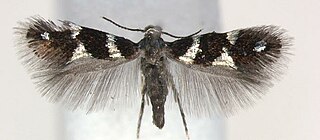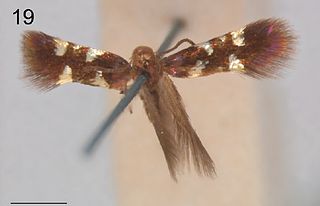
The Heliozelidae, commonly known as shield-bearer moths, are a family of small, day flying monotrysian moths distributed worldwide. The larvae of most heliozelid species are leaf miners who cut distinctive shield-shaped cases from the surface of the host leaf, hence the common name. Some species are considered pests of commercial crops such as grapevines, cranberries, and walnuts. The taxonomy of this family is poorly understood.

Antispila treitschkiella is a species of moth of the family Heliozelidae. It is found from Great Britain to Ukraine and from Sweden to France, Italy and Greece. It is also found in Portugal.

Antispila metallella is a moth of the family Heliozelidae. It is found from Scandinavia to the Pyrenees, Alps and Romania and from Great Britain to Russia.

Antispila isabella is a species of moth of the family Heliozelidae. It is found in Ontario, Connecticut, Georgia, Kentucky, New York, Pennsylvania and Vermont. However, research concludes that a complex of species is involved under this name.
Antispila ampelopsia is a moth of the family Heliozelidae. It was described by Kuroko in 1961. It is found in Japan.
Antispila orbiculella is a moth of the family Heliozelidae. It was described by Kuroko in 1961. It is found in Japan.
Antispila corniella is a moth of the family Heliozelidae. It was described by Kuroko in 1961. It is found in Japan (Kyushu).
Antispila iviella is a moth of the family Heliozelidae. It was described by Kuroko in 1961. It is found in Japan (Yakushima).
Antispila hikosana is a moth of the family Heliozelidae. It was described by Kuroko in 1961. It is found in Japan (Kyushu).
Antispila hydrangifoliella is a moth of the family Heliozelidae. It was described by Kuroko in 1961. It is found in Japan (Kyushu).

Antispila aristarcha is a moth of the family Heliozelidae. It was described by Edward Meyrick in 1916. It is found in India.
Antispila aurirubra is a moth of the family Heliozelidae. It was described by Annette Frances Braun in 1915. It is found in the US state of California.
Antispila cleyerella is a moth of the family Heliozelidae that is endemic to Japan.
Antispila cornifoliella is a moth of the family Heliozelidae. It is found in North America, including Alberta, Maryland, Ohio, Ontario, Pennsylvania and Quebec.
Antispila distyliella is a moth of the family Heliozelidae. It is found on the Ryukyu Islands in Japan.
Antispila freemani is a moth of the family Heliozelidae. It was described by J. Donald Lafontaine in 1973. It is found in North America, including Ontario and British Columbia.
Antispila inouei is a moth of the family Heliozelidae. It was described by Kuroko in 1987. It is found in Japan.
Antispila tateshinensis is a moth of the family Heliozelidae. It was described by Kuroko in 1987. It is found in Japan.
Antispila uenoi is a moth of the family Heliozelidae. It was described by Kuroko in 1987. It is found in Japan. In 2018, the species was found from China.

Aspilanta viticordifoliella is a species of moth in the family Heliozelidae. It is found in eastern North America. The larvae are leaf miners that feed on Virginia creeper, false Virginia creeper, and frost grape.



